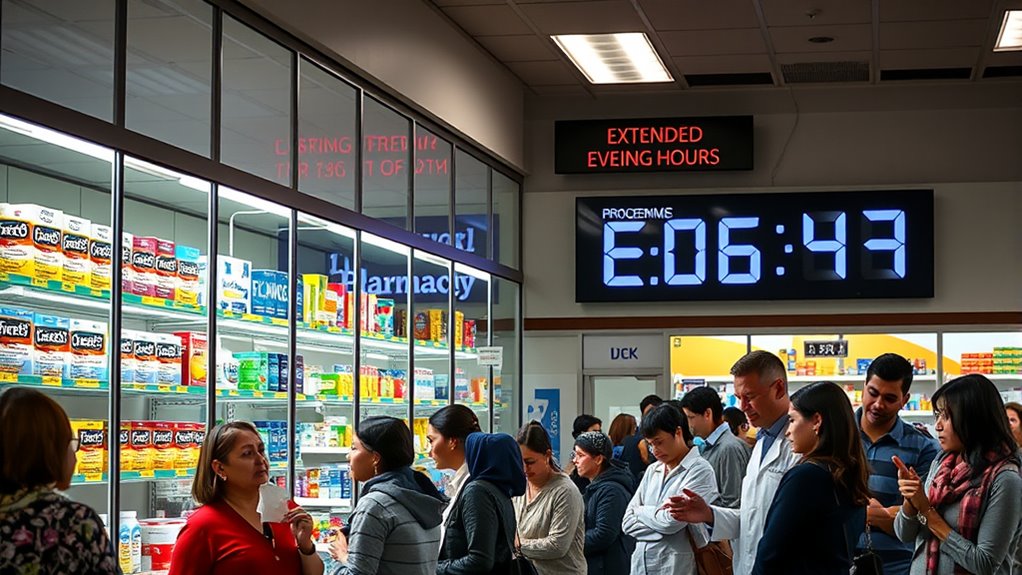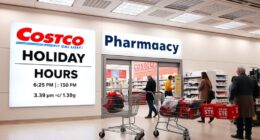Extended pharmacy hours during flu season help you get tested, vaccinated, and treated quickly, especially if your schedule is busy. By offering flexible hours, pharmacies make it easier to recognize symptoms early and access antivirals within the vital 48-hour window. This rapid access can reduce illness severity and protect vulnerable populations. Continuing to explore this topic will show you how these extended hours support your health and community safety during peak flu times.
Key Takeaways
- Extended pharmacy hours increase access for timely flu testing, vaccination, and antiviral treatment during peak season.
- Longer hours enable prompt care for high-risk populations, reducing illness severity and complications.
- Early treatment within 48 hours of symptom onset is more effective; extended hours help ensure timely intervention.
- Pharmacists can provide immediate health education and support for recognizing severe symptoms requiring urgent care.
- Extended hours support community health by decreasing healthcare system strain and promoting faster response to flu cases.
Importance of Timely Flu Treatment During Peak Season
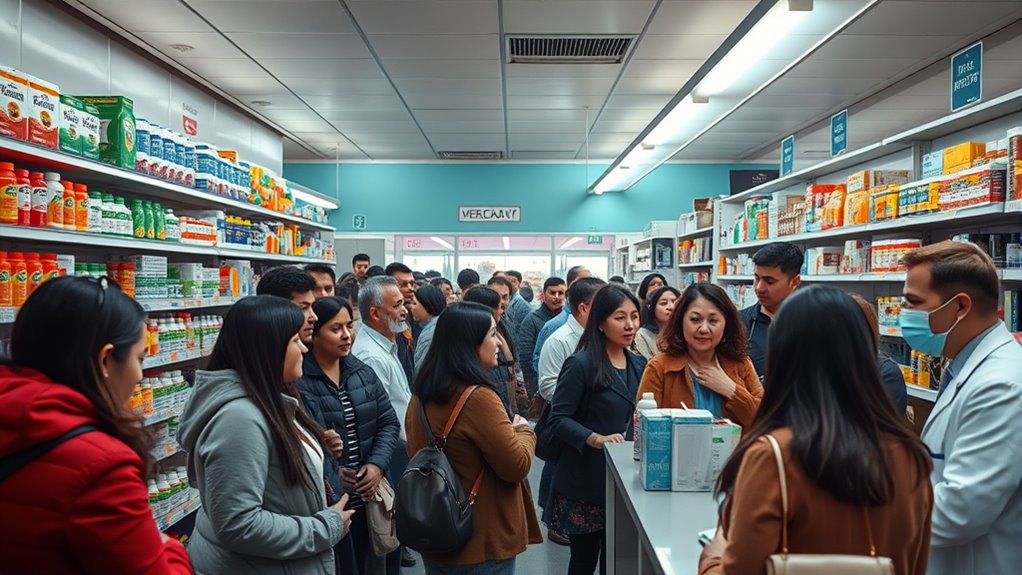
During peak flu season, timely treatment is essential because antiviral medications are most effective when started within 48 hours of symptom onset. Vaccine efficacy can vary due to seasonal variations, which influence how well the flu shot protects you each year. Early treatment helps reduce symptom severity, shorten illness duration, and lower the risk of complications, especially for vulnerable groups. With flu activity peaking between December and February, quick access to antivirals is crucial to prevent hospitalizations and community spread. Extended pharmacy hours make it easier to get diagnosed and treated promptly, ensuring you don’t delay care during critical days. Being proactive during these peak months can considerably improve your health outcomes and help control the seasonal impact of the flu. Understanding industry trends also plays a role in ensuring effective flu management strategies.
How Extended Pharmacy Hours Improve Access to Care
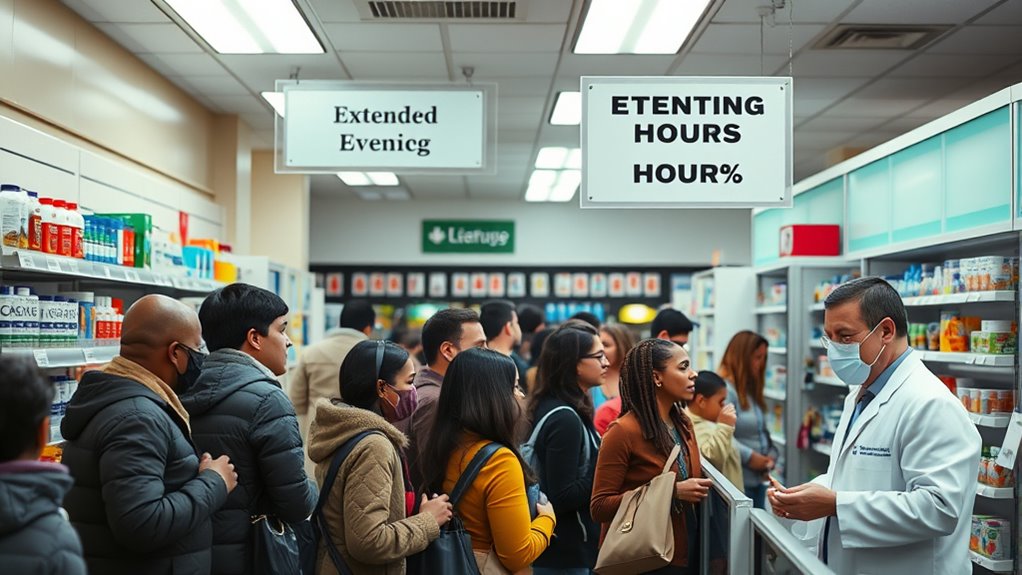
Extended pharmacy hours considerably boost access to care during peak flu season by offering more flexible times for testing, vaccination, and treatment. This flexibility helps you get timely vaccinations, especially if you have a busy schedule or work non-standard hours. Pharmacies also support effective vaccination strategies by making immunizations more convenient, increasing overall coverage. Additionally, extended hours allow pharmacists to provide essential health education, helping you recognize symptoms and understand when to seek treatment. Quick access to testing and antiviral medications during these hours can reduce the severity of illness and prevent complications. By removing scheduling barriers, longer pharmacy hours ensure you’re better positioned to protect yourself and your loved ones throughout the extended flu season. Incorporating healthy breakfast options into your routine can also strengthen your immune system and improve overall health during flu season.
Recognizing Flu Symptoms and When to Seek Help
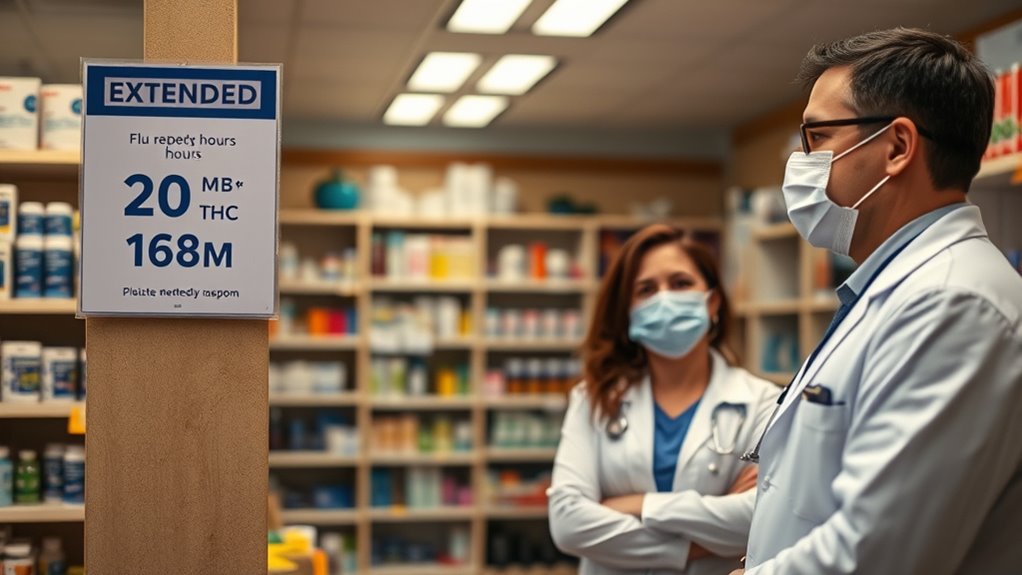
You should know the common flu symptoms like fever, cough, sore throat, and body aches, so you can identify when you’re coming down with the flu. Watch for severe signs such as difficulty breathing, chest pain, or confusion, which require immediate medical attention. When these symptoms appear, visiting your pharmacy quickly can help you get tested, treated, or referred to a healthcare provider. Additionally, being aware of somatic therapy techniques can support emotional well-being during illness recovery.
Common Flu Symptoms
How can you tell if you have the flu? Common symptoms include fever, chills, muscle aches, fatigue, sore throat, cough, and runny nose. You might also experience headaches and some gastrointestinal issues like nausea or diarrhea, especially in children. Recognizing these signs early helps you seek treatment quickly. Don’t fall for flu vaccine myths that it’s unnecessary or ineffective—instead, get vaccinated to reduce your risk. Flu prevention tips also include frequent handwashing, avoiding close contact with sick people, and practicing good hygiene. If symptoms worsen or you’re in a high-risk group, visit your pharmacy for testing and antiviral options. Extended pharmacy hours make it easier to get treatment promptly, helping you recover faster and avoid complications. Proper air quality management, such as using an air purifier, can also support your immune system during flu season.
Severe Symptom Indicators
While many flu cases are mild, recognizing severe symptoms early is essential for prompt treatment and preventing complications. Signs of severe symptoms include difficulty breathing, chest pain, sudden dizziness, confusion, or persistent high fever. These indicate higher flu complication risks and symptom severity, requiring immediate medical attention. If you experience shortness of breath or bluish lips, seek help right away. Severe weakness, inability to keep fluids down, or symptoms that worsen after several days also signal the need for urgent care. Early recognition allows for timely antiviral treatment, which can reduce symptom severity and decrease the chance of serious health issues. Additionally, understanding the role of vaccination can help prevent severe cases. Don’t wait if you notice these warning signs—prompt action can make a significant difference in your recovery.
When to Visit Pharmacy
Recognizing the early signs of flu is essential for seeking prompt care at your pharmacy. Common symptoms include fever, chills, cough, sore throat, muscle aches, and fatigue. If you notice these, especially during peak flu season, don’t delay visiting your pharmacy. With ongoing vaccine distribution efforts and increased public awareness, getting vaccinated remains crucial, but early treatment is equally important. Visiting your pharmacy quickly allows for rapid testing, antiviral prescriptions, and advice on managing symptoms. Extended hours mean you can seek help even outside regular times, reducing the risk of complications. Remember, the sooner you act, the better your chances of recovery. Keep an eye on flu activity reports and don’t hesitate to visit your pharmacy if symptoms appear, especially during heightened seasonal activity. Regular use of Glycolic Acid skincare products can also help maintain healthy skin, which is important when your immune system is compromised.
The Role of Pharmacists in Flu Prevention and Management
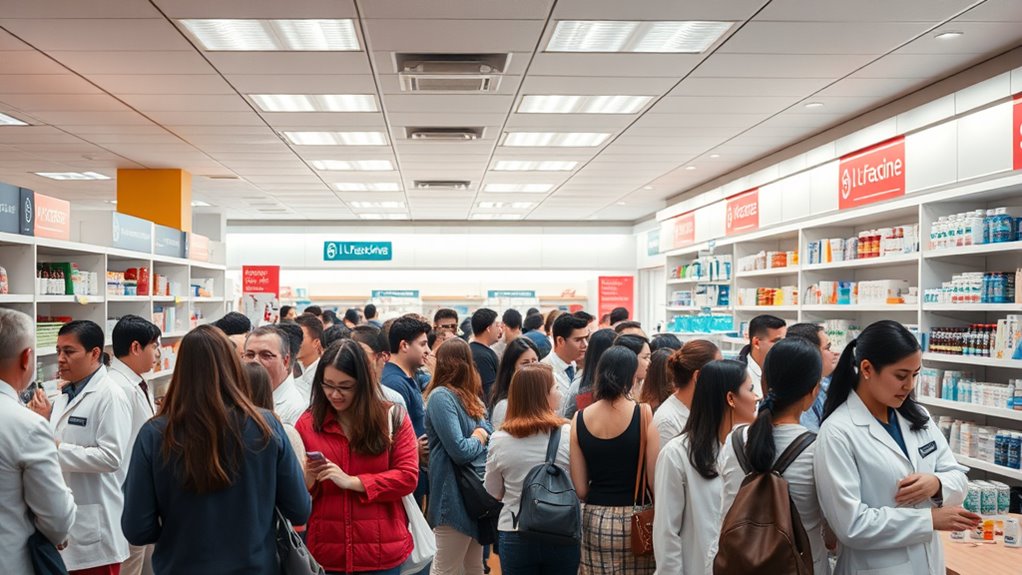
Pharmacists play a vital role in preventing and managing the flu during peak season by providing accessible vaccinations, patient education, and timely treatment options. You can rely on pharmacists to deliver vaccines with high vaccine efficacy, helping protect you and your community from severe illness. They also stay informed about antiviral resistance, ensuring they recommend effective medications and avoid contributing to resistant strains. By offering extended hours, pharmacists make it easier for you to get vaccinated or receive treatment quickly, especially when symptoms start or if you’re in a high-risk group. Their expertise helps you make informed decisions about flu prevention and management, reducing the burden on emergency services and improving your chances of a swift recovery. Additionally, understanding projector technology can enhance your home entertainment setup, making your viewing experience more immersive and enjoyable.
Ensuring Rapid Testing and Antiviral Availability
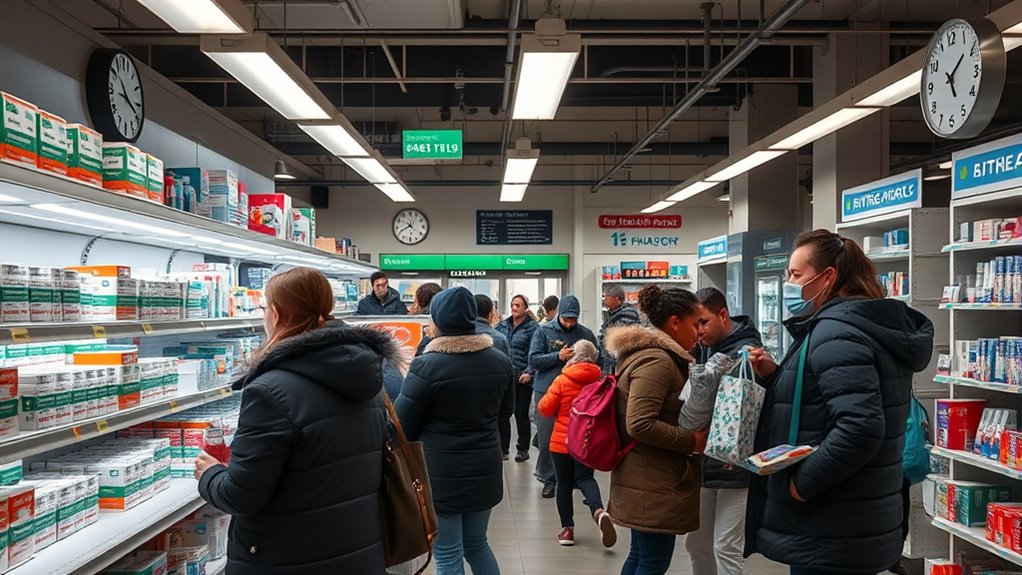
Rapid testing and immediate access to antivirals are essential components of effective flu management during peak season. To guarantee timely treatment, pharmacies should prioritize: 1. Stocking antivirals like oseltamivir and baloxavir, ensuring quick availability for those diagnosed. 2. Implementing rapid testing protocols to distinguish flu from other respiratory illnesses, boosting vaccine efficacy through accurate diagnosis. 3. Extending pharmacy hours to accommodate walk-ins and reduce delays in testing and treatment. 4. Raising public awareness about early testing and treatment options, emphasizing the importance of prompt action during the flu season. Incorporating proper toilet maintenance practices can also help prevent health hazards associated with plumbing issues, further supporting public health efforts during flu outbreaks.
Protecting Vulnerable Populations With Faster Treatment
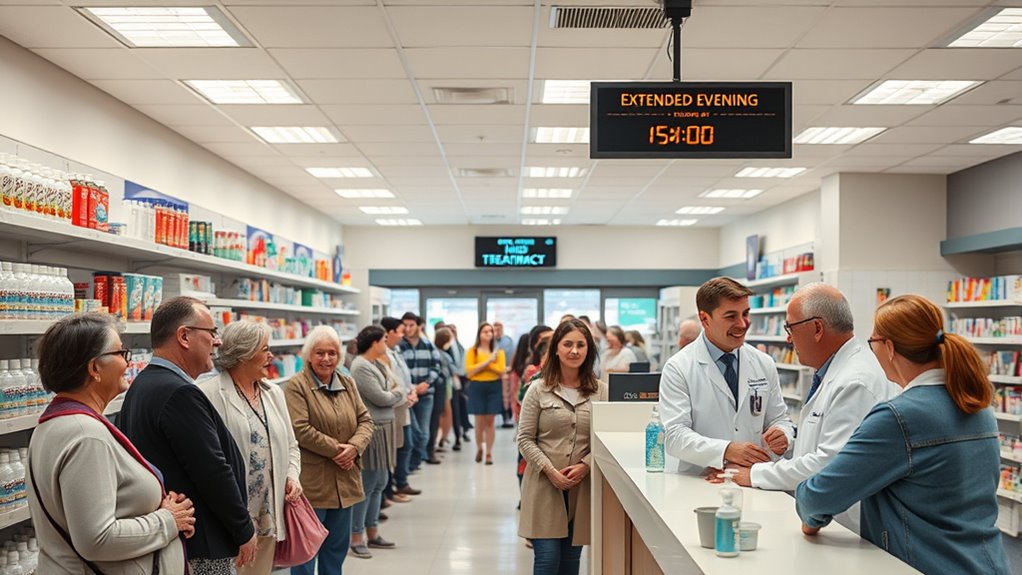
During flu season, vulnerable populations such as young children, older adults, pregnant women, and those with chronic health conditions face higher risks of severe illness and complications. To protect them, faster treatment is crucial. Extended pharmacy hours help you access early testing and antiviral medications within the critical 48-hour window, improving vaccine efficacy and reducing illness severity. Prompt treatment not only benefits individuals but also supports herd immunity by lowering virus spread. When high-risk groups receive timely care, it diminishes the overall burden on healthcare systems. Your local pharmacy’s extended hours make it easier to get tested, vaccinated, and treated quickly, ensuring vulnerable populations aren’t left waiting and are protected from the most serious flu-related outcomes. Additionally, raising awareness about early intervention can significantly improve health outcomes during peak flu activity.
Preparing Your Pharmacy for Increased Flu Season Demand
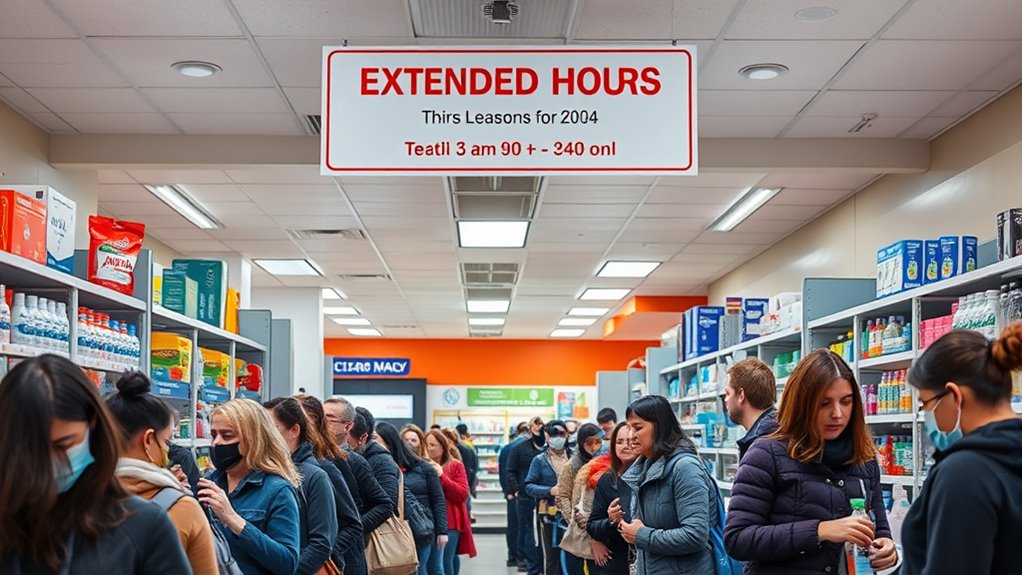
As flu activity ramps up, your pharmacy needs to be prepared to handle increased patient demand efficiently. Start by guaranteeing your staff is trained in rapid vaccine development updates and can answer questions about flu prevention. Next, focus on boosting public awareness through posters, social media, and community outreach to promote vaccination and early treatment. Then, stock up on antiviral medications, OTC remedies, and flu testing supplies to meet higher demand. Finally, extend your hours during peak weeks to offer convenient access for patients with urgent needs. These steps will help your pharmacy manage the surge, provide timely care, and support public health efforts during the extended flu season. Being proactive now ensures you can serve your community effectively. Paint Sprayer Reviews & Buying Guides
Frequently Asked Questions
How Can I Find Pharmacies With Extended Hours Near Me?
You can find pharmacies with extended hours near you by using a pharmacy locator tool. Many pharmacy chains offer online locators that show store hours, including those with extended hours during flu season. Simply enter your zip code or city, and you’ll see which locations are open later or on weekends. This way, you can easily access vaccination, testing, and treatment services when you need them most.
Are There Specific Vaccines Recommended for High-Risk Groups?
For high-risk groups, the CDC recommends specific flu shot recommendations, including high-dose or adjuvanted vaccines for older adults, and nasal sprays or injections for children. These high risk vaccinations help protect vulnerable populations from severe illness. You should ask your healthcare provider or pharmacist about the best flu shot options tailored to your age and health status, ensuring you get the most effective protection during flu season.
What Should I Do if I Develop Flu Symptoms Outside Pharmacy Hours?
Think of your health as a precious flame that needs immediate attention. If you develop flu symptoms outside pharmacy hours, don’t let it flicker out. You should consider home remedies like rest, hydration, and over-the-counter meds, but the best move is to schedule a telemedicine consultation. This way, a healthcare professional can assess your symptoms and guide you on whether you need antiviral treatment or further care.
How Early Can I Get Vaccinated to Ensure Protection?
You should get vaccinated as early as possible in the flu season to build immunity timing, ideally in September or October. This allows your body enough time to develop protection before flu activity peaks. Vaccine scheduling is flexible, so even if you get vaccinated later, it still provides benefits. Remember, immunity timing varies, but early vaccination maximizes your chances of staying healthy throughout the extended flu season.
Do Pharmacies Offer Testing for Flu, COVID-19, and RSV Simultaneously?
Over 60% of pharmacies offer flu testing, covid testing, and RSV screening simultaneously, making it easier for you to get thorough care. During peak flu season, many pharmacies provide rapid, combined testing for these respiratory illnesses, helping you quickly identify the cause of your symptoms. This approach improves diagnosis accuracy and guarantees timely treatment, especially since early antiviral therapy can greatly reduce severity and complications.
Conclusion
While extended pharmacy hours promise quicker flu treatment, it’s ironic how many still delay seeking help until symptoms worsen. Don’t wait until you’re bedridden to realize the importance of timely care. Take advantage of these longer hours now—your health can’t afford the irony of missed opportunities. Stay proactive, recognize symptoms early, and let’s make this flu season the one where prevention and prompt treatment truly save lives. Don’t let irony be your only lesson.

